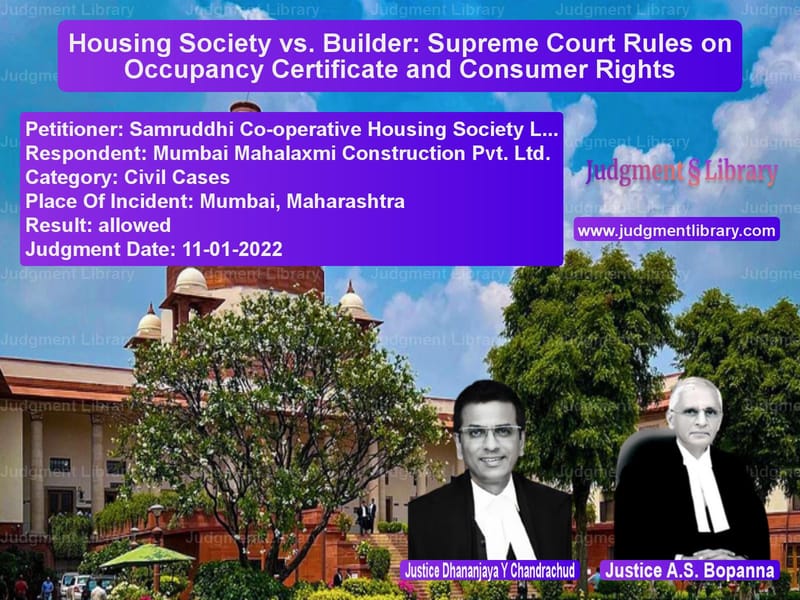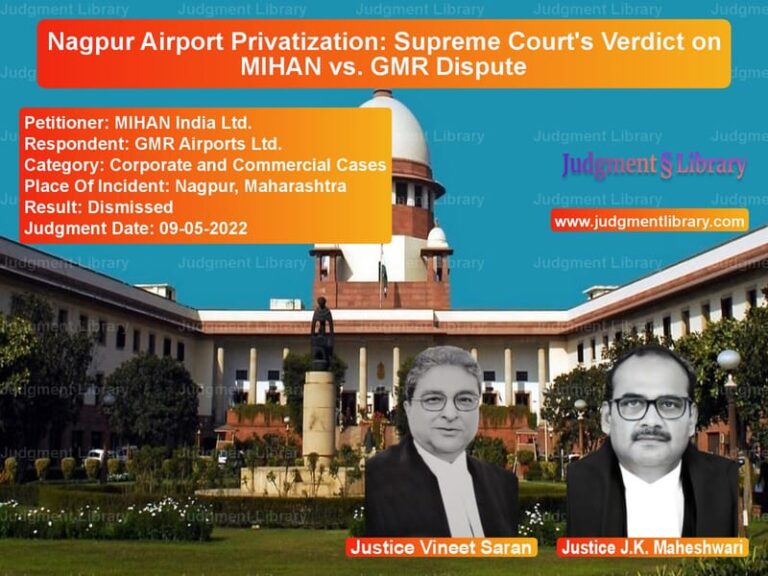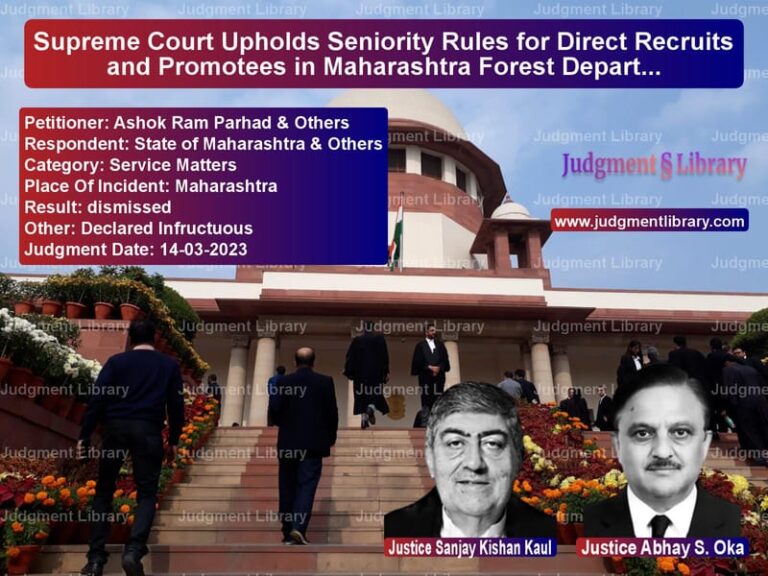Housing Society vs. Builder: Supreme Court Rules on Occupancy Certificate and Consumer Rights
The Supreme Court of India recently delivered an important judgment in the case of Samruddhi Co-operative Housing Society Ltd. vs. Mumbai Mahalaxmi Construction Pvt. Ltd., addressing issues related to a builder’s failure to obtain an occupancy certificate and its impact on residents. The Court ruled in favor of the housing society, holding that the complaint was maintainable under consumer law and ordering the National Consumer Disputes Redressal Commission (NCDRC) to adjudicate the matter within three months.
Background of the Case
The case originated when Samruddhi Co-operative Housing Society Ltd. filed a consumer complaint against Mumbai Mahalaxmi Construction Pvt. Ltd., alleging deficiency in service due to the builder’s failure to obtain an occupancy certificate. As a result, the society members were forced to pay higher municipal taxes and water charges. The builder had constructed two residential wings (A and B) and sold flats under agreements governed by the Maharashtra Ownership Flats (Regulation of the Promotion of Construction, Sale, Management, and Transfer) Act, 1963 (MOFA). The flats were booked in 1993, and possession was granted in 1997.
Due to the absence of an occupancy certificate, the residents had to pay 25% higher property tax and 50% additional charges for water. The society pursued legal action, demanding reimbursement of ₹2.60 crores in excess payments, along with ₹20 lakhs as compensation for mental agony and inconvenience.
Key Legal Issues
- Was the complaint barred by limitation under Section 24A of the Consumer Protection Act, 1986?
- Did the housing society qualify as a ‘consumer’ under the Consumer Protection Act?
- Did the builder’s failure to obtain an occupancy certificate constitute a ‘deficiency in service’?
- Was the complaint a mere recovery proceeding or a genuine consumer dispute?
Arguments by the Housing Society
The appellant, represented by Advocate Sunil Fernandes, contended that:
- The failure to obtain an occupancy certificate resulted in a continuing cause of action, making the complaint within limitation.
- The builder’s obligation to obtain an occupancy certificate was clearly mandated by MOFA.
- Due to the deficiency in service, residents had to bear additional financial burdens for decades.
- The offer of a ₹1 crore one-time settlement by the builder in 2014 indicated an acknowledgment of liability.
- The housing society fell within the definition of ‘consumer’ as they had availed services from the builder.
Arguments by the Builder
The respondent, represented by Advocate Atul Babasaheb Dakh, countered that:
- The claim was barred by limitation, as the cause of action arose in 1997 when possession was given.
- The residents occupied the flats despite the absence of an occupancy certificate, making them responsible for additional municipal charges.
- The builder was not responsible for the water and property taxes charged by municipal authorities.
- The society had already accepted partial compensation from the builder, weakening their claim for additional damages.
- The complaint was a recovery suit disguised as a consumer dispute.
Supreme Court’s Observations
The Supreme Court bench, comprising Justice Dr. Dhananjaya Y Chandrachud and Justice A.S. Bopanna, made the following key observations:
“The builder’s obligation under Section 6 of the MOFA is to obtain the occupancy certificate. The failure to do so results in a continuing cause of action, making the complaint maintainable.”
“The residents are compelled to pay higher taxes annually due to the builder’s failure, creating an ongoing impact that is not restricted to a single point in time.”
“The deficiency in service is evident, as the builder did not fulfill a statutory obligation that directly affects the financial burden on flat buyers.”
Key Legal Findings
- Continuing Cause of Action: The failure to obtain an occupancy certificate led to continuous financial harm to the residents, justifying the delay in filing the complaint.
- Consumer Protection: The housing society qualified as a consumer under the Consumer Protection Act, as they availed services from the builder.
- Deficiency in Service: The builder’s failure to obtain the occupancy certificate was a clear breach of service obligations under MOFA.
- Compensation Entitlement: The residents were entitled to seek reimbursement for excess payments made due to the builder’s negligence.
Final Judgment
The Supreme Court set aside the NCDRC’s ruling and directed it to adjudicate the complaint within three months. The Court ruled:
“The complaint is maintainable. The NCDRC shall decide the case on its merits and issue appropriate relief to the housing society.”
Implications of the Judgment
This ruling establishes an important precedent in real estate law:
- Builders’ Accountability: Developers must obtain occupancy certificates, failing which they may be held liable for financial damages.
- Protection for Homebuyers: Consumers can seek compensation for additional charges resulting from a builder’s negligence.
- Expanded Scope of Consumer Law: Recovery of extra payments due to service deficiencies falls within the ambit of consumer disputes.
Conclusion
The Supreme Court’s ruling ensures justice for homebuyers affected by builder negligence. By recognizing the ongoing nature of financial harm and upholding consumer rights, the judgment sets a powerful precedent for similar disputes in the future.
Petitioner Name: Samruddhi Co-operative Housing Society Ltd..Respondent Name: Mumbai Mahalaxmi Construction Pvt. Ltd..Judgment By: Justice Dhananjaya Y Chandrachud, Justice A.S. Bopanna.Place Of Incident: Mumbai, Maharashtra.Judgment Date: 11-01-2022.
Don’t miss out on the full details! Download the complete judgment in PDF format below and gain valuable insights instantly!
Download Judgment: samruddhi-co-operati-vs-mumbai-mahalaxmi-con-supreme-court-of-india-judgment-dated-11-01-2022.pdf
Directly Download Judgment: Directly download this Judgment
See all petitions in Property Disputes
See all petitions in Consumer Rights
See all petitions in Contract Disputes
See all petitions in Judgment by Dhananjaya Y Chandrachud
See all petitions in Judgment by A. S. Bopanna
See all petitions in allowed
See all petitions in supreme court of India judgments January 2022
See all petitions in 2022 judgments
See all posts in Civil Cases Category
See all allowed petitions in Civil Cases Category
See all Dismissed petitions in Civil Cases Category
See all partially allowed petitions in Civil Cases Category







